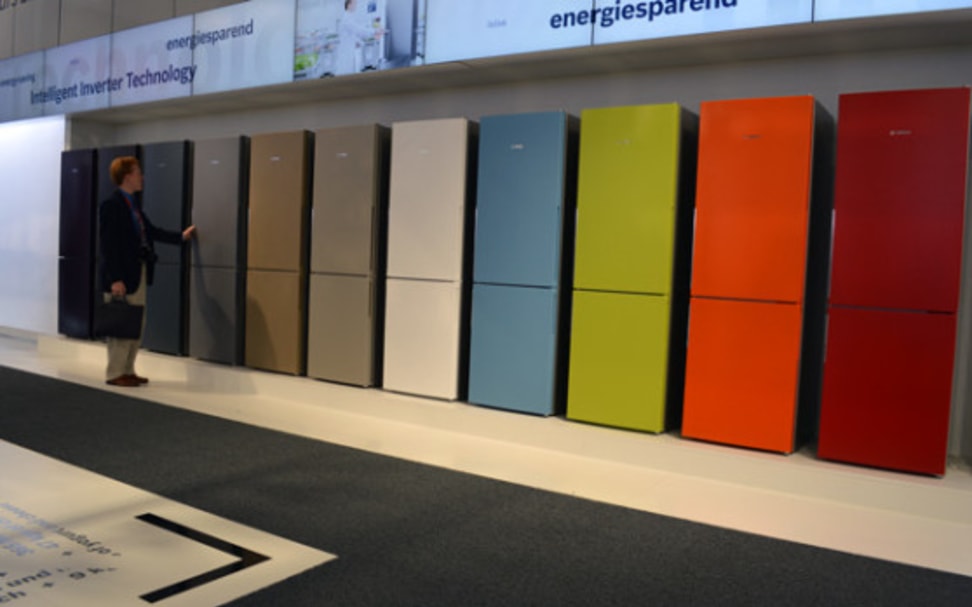Europe's Appliances Are Cooler, Prettier, and More Popular
The US lags way behind Europe when it comes to appliance culture, and it's on full display at IFA Berlin.
 Credit:
Reviewed.com
Credit:
Reviewed.com
Products are chosen independently by our editors. Purchases made through our links may earn us a commission.
At the IFA 2013 trade show in Berlin, the most buzzed-about announcements have been for big gadgets from some of the most familiar names in tech. When the dust settles and these TVs, tablets, and smart watches start hitting the streets, you'll be as likely to find them in Berlin as you are in Boston or Beijing.
Gadgets are gadgets, regardless of country code, but the lesson to learn at IFA is that there's a big culture gap in the way that Americans and Europeans live with their tech—especially in the way that they furnish their homes. IFA is a massive showcase for home appliances, particularly those from major European brands like Bosch, Miele, and Electrolux AEG (among others that most Americans have probably never heard of). The dishwashers, fridges, ranges, and laundry machines are like strange mutations of the machines you'd see in the States.
{{brightcove '2651689947001'}}
Think of it like the difference between the English and German languages: They share common ancestors, but over time they've become foreign enough for the details to get lost in translation. Regardless of nationality, manufacturers push the basic message that a better machine leads to an easier, happier, and generally better life. But what constitutes a better machine is very much up for debate. In the US, an innovative appliance saves time and money. In Europe, it works smarter and looks good doing it.
The most immediately striking difference between the appliances here at IFA and those in typical American homes is in the sleek designs of the European models. Looking good is feeling good, and these machines are meant for more than just doing your chores.
"Great design makes [appliances] a pleasure to use," said Samsung's Won Park-Costof at a press conference announcing the company's see-through double-door fridge. (Samsung is a South Korean company, but it has the largest share of the European refrigerator market.)
Since there's not a similar appliance culture in the United States, there's not a big American appliance trade show. The annual Consumer Electronics Show in Las Vegas is the next closest thing, but unlike IFA it's closed to the public, and appliance tech plays only a peripheral role. At CES 2013, the only significant appliance stories concerned an oven running Android, and a Samsung fridge capable of posting to Evernote and Twitter.
RELATED: European Appliances Take Inspiration from Simpler Times, Supercar Designs and Smiling Mimes
But at IFA, there are at least a dozen cool new appliance innovations to scope out, packed with experimental features that are rare (if not completely unheard of) in the US. Siemens showed off a fridge that takes a picture of its own interior, so that you can see its contents while you're away—at the supermarket, for instance. Totally flat, monolithic induction cooktops were everywhere, including one from Bosch with two huge "flex" cooking zones (rather than four individual zones for pots and pans).
Miele's new flagship W1 washer, introduced at IFA, has a feature called TwinDos. It's a big compartment that holds two pre-measured detergent tubs, which only need to be filled every few dozen cycles. The W1's PowerWash feature can re-circulate soapy water rather than just dredging clothes through the same dirty puddle. The matching T1 dryer has a nozzle in the door, meant for a steam cycle. Miele also debuted a new dishwasher that opens by knocking twice on the front panel. It has no exterior handle or buttons, so it can just blend into your cabinetry.
There are giant booths at this conference dedicated to these machines, and actual press conferences to announce them. (In the US, most products are introduced through statements, or just quietly appear in showrooms.) It's a world apart from any stateside show.
So what will it take for Americans to start celebrating appliances, rather then treating them like a chore? A place to get excited about them would be a great start.
